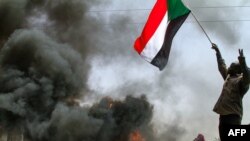Sudan's Transitional Sovereign Council a statement Sunday the decision to lift the emergency decree was taken to try to set the stage for "a fruitful and meaningful dialogue that achieves stability during the transitional period."
The order lifting the emergency state came after longstanding calls by civil society and freedom groups. Its removal was raised by UN Special Representative Volker Perthes after two protestors were killed Saturday in anti-coup protests.
General al-Burhan's decree also ordered the release of hundreds of activists rounded up in the clampdown under emergency laws. The coup leader has said he wants to create a situation for constructive talks among Sudanese factions.
The African Union, the United Nations, and the regional multinational bloc IGAD, have been pushing for Khartoum to make such talks possible in order to try to resolve the military-civilian crisis.
The AU-UN-IGAD bid has been supported by Western nations, who urged Sudanese factions to participate in the process.
The October 25 coup led by al-Burhan shattered a fragile transition back to civilian control after President Omar al-Bashir was ousted in 2019.
The military's seizure of power triggered aid cuts by Western governments and widespread international condemnation, to pressure Khartoum to get back on the reversion track.
The cuts and sanctions hit Sudan hard because it's one of the poorest countries in Africa, and its economy has been fragile due to mismanagement under Bashir and resulting international isolation.
This report contains information obtained from Agencie France Presse and Reuters
